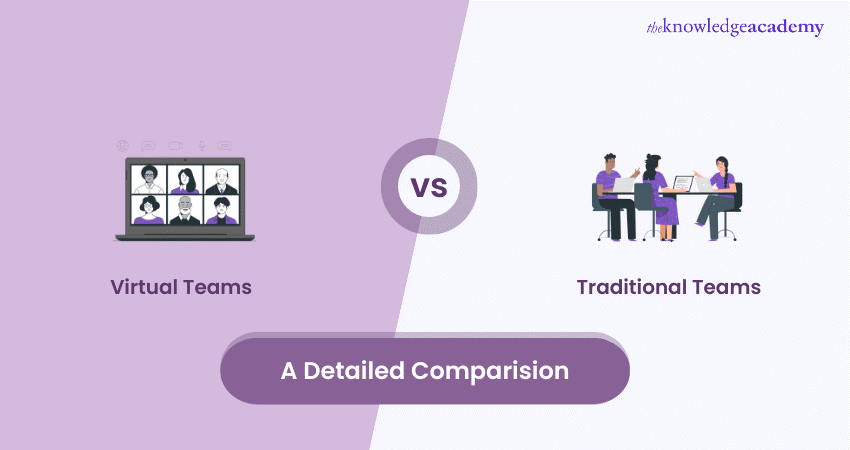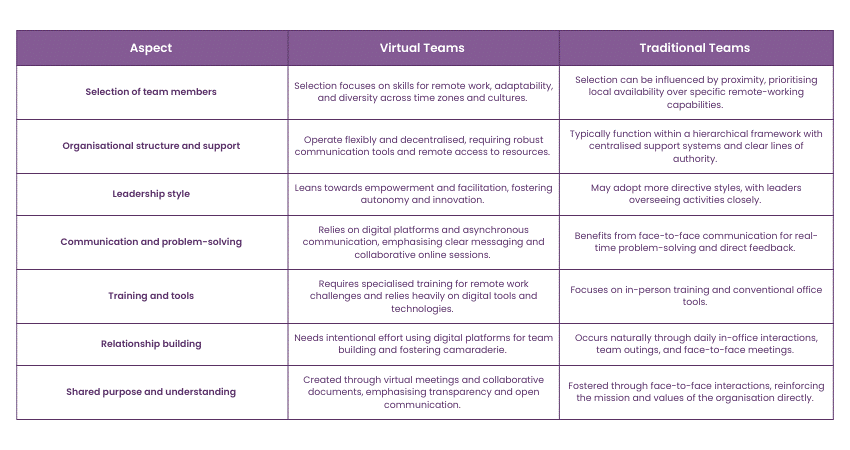We may not have the course you’re looking for. If you enquire or give us a call on +44 1344 203 999 and speak to our training experts, we may still be able to help with your training requirements.
Training Outcomes Within Your Budget!
We ensure quality, budget-alignment, and timely delivery by our expert instructors.

Embark on a journey to decipher the dynamics between Virtual Teams vs Traditional Teams. The clash between Virtual and Traditional Teams becomes increasingly evident as the professional landscape evolves. Join us in unravelling the intricacies of team collaboration and discovering which mode best suits your organisational needs.
Table of Contents
1) What are Virtual Teams?
2) What are Traditional Teams?
3) Difference between Virtual Teams vs Traditional Teams
a) Selection of team members
b) Organisation structure and support
c) Leadership style
d) Communication and problem-solving
e) Training and tools
f) Relationship building
g) Shared purpose and understanding
4) Conclusion
What are Virtual Teams?
Venture into the realm of Virtual Teams, where geographical boundaries blur, and technology becomes the bridge connecting diverse talents. Explore examples ranging from global Software Development teams to dynamic marketing collaborations and interdisciplinary research projects leveraging cloud-based applications. Virtual Teams allow anyone to work from anywhere at any time with the base priority of getting the job done.
What are Traditional Teams?
Traditional Teams are a more familiar territory, where face-to-face interactions shape the collaborative landscape. Dive into scenarios like sales teams conducting regular meetings, production teams working in a shared physical space, and project teams collaborating within designated areas.
Difference between Virtual Teams vs Traditional Teams
Now that you know what Virtual and Traditional Teams are, let's dive into their differences. Read along to understand the differences between the two in detail.

1) Selection of team members
Selecting the right members for Virtual Teams is crucial. They need to possess the required skills and be adaptable to work independently and effectively in a remote setting. Diversity in skill sets becomes essential to covering a variety of tasks and challenges that may arise across different time zones and cultural contexts.
Learn how to screen applications and select the perfect fits for your Virtual Team, with our Online Virtual Recruitment Training - Sign up now!
Unlike Traditional Teams, where proximity might influence member selection, Virtual Teams prioritise individuals who can thrive in a digital workspace and collaborate seamlessly despite physical distances.
2) Organisation structure and support
The organisational structure of Virtual Teams differs significantly from Traditional Teams. Virtual Teams operate more flexibly and decentralised, allowing members to work from various locations and time zones. This flexibility necessitates a support system that caters to the diverse needs of remote workers, such as robust communication tools, remote access to resources, and efficient troubleshooting mechanisms.
In contrast, Traditional Teams typically function within a hierarchical framework, with centralised support systems and clear lines of authority.
3) Leadership style
Leadership styles in Virtual Teams often lean towards empowerment and facilitation rather than micromanagement. Given the distributed nature of Virtual Teams, leaders must foster autonomy among team members while providing guidance and support as needed. This approach encourages innovation, collaboration, and a sense of ownership among remote workers. On the other hand, Traditional Teams may adopt more directive leadership styles, where leaders closely oversee team activities and make decisions based on centralised authority and established protocols.
4) Communication and problem-solving
Due to team members' geographical dispersion, communication in Virtual Teams relies heavily on digital platforms and asynchronous communication methods. Effective communication entails clear and concise messaging, active listening, and appropriate communication channels to ensure everyone is on the same page despite distances and time zone differences.
Become the go-to consultant for Virtual Teams with our Virtual Consultant Training - Register Now!
Problem-solving in Virtual Teams often involves collaborative brainstorming sessions facilitated by virtual meeting tools. These sessions emphasise creative solutions and leverage diverse perspectives. In contrast, Traditional Teams benefit from immediate face-to-face communication, enabling real-time problem-solving through direct interactions and instant feedback loops.
5) Training and tools
Virtual Teams require specialised training to navigate the challenges of remote work effectively. Training programs may include:
1) Sessions on utilising digital tools
2) Managing time effectively in a remote setting
3) Fostering effective communication and collaboration
Additionally, Virtual Teams rely on various digital tools and technologies to facilitate their work, such as project management software, video conferencing platforms, and cloud-based storage solutions. Traditional Teams, on the other hand, may focus more on in-person training sessions and conventional office tools.
6) Relationship building
Building strong relationships within Virtual Teams requires intentional effort and the use of digital platforms to facilitate interactions and foster a sense of camaraderie among team members. Strategies such as Virtual Team-building activities, regular check-ins, and informal communication channels can help bridge the gap created by physical distance and promote a sense of belonging.
In Traditional Teams, relationship building often occurs naturally through daily interactions in the office environment, team outings, and face-to-face meetings, fostering trust and collaboration among team members.
7) Shared purpose and understanding
Creating a shared purpose in Virtual Teams involves clearly defining goals, values, and expectations through virtual meetings and collaborative documents. Emphasising transparency and open communication channels helps ensure alignment despite physical distance.
Traditional Teams foster shared understanding through face-to-face interactions, reinforcing organisational mission and values. Both approaches aim to unite team members towards common objectives, regardless of the team's structure.
Learn how to manage a team from anywhere! Sign up for our Managing Remote Teams Training! - Register now!
Conclusion
In this blog, we discussed Virtual Teams vs Traditional Teams and detailed their differences. Additionally, we emphasised how understanding the nuances between these two paradigms is crucial for effective team management and achieving organisational goals in today's dynamic work environment.
Frequently Asked Questions

Foster trust by sharing personal and professional information, using videoconferencing for visual cues, being responsive and reliable, and providing constructive feedback.

Address root causes, listen empathetically to team members' perspectives, focus on win-win solutions, and seek mediation from a third party if needed to resolve conflict effectively.

The Knowledge Academy takes global learning to new heights, offering over 30,000 online courses across 490+ locations in 220 countries. This expansive reach ensures accessibility and convenience for learners worldwide.
Alongside our diverse Online Course Catalogue, encompassing 17 major categories, we go the extra mile by providing a plethora of free educational Online Resources like News updates, Blogs, videos, webinars, and interview questions. Tailoring learning experiences further, professionals can maximize value with customisable Course Bundles of TKA.

The Knowledge Academy’s Knowledge Pass, a prepaid voucher, adds another layer of flexibility, allowing course bookings over a 12-month period. Join us on a journey where education knows no bounds.

The Knowledge Academy offers various Business Skills, including Logistics Management Training, Financial Management and Behaviour Management Training. These courses cater to different skill levels, providing comprehensive insights into 10 Challenges of Virtual Teams and How to Solve Them.
Our Business Skills Blogs cover a range of topics related to Leadership, offering valuable resources, best practices, and industry insights. Whether you are a beginner or looking to advance your Project Management skills, The Knowledge Academy's diverse courses and informative blogs have you covered.
Upcoming Business Skills Resources Batches & Dates
Date
 Managing Remote Teams
Managing Remote Teams
 Halloween sale! Upto 40% off - Grab now
Halloween sale! Upto 40% off - Grab now







 Top Rated Course
Top Rated Course



 If you wish to make any changes to your course, please
If you wish to make any changes to your course, please


